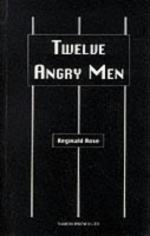
|
| Name: _________________________ | Period: ___________________ |
This test consists of 15 multiple choice questions and 5 short answer questions.
Multiple Choice Questions
1. How does the dissenting juror suggest that the jury should proceed instead of declaring a "hung" jury?
(a) He suggests they all take a new vote.
(b) He suggests they deliberate further.
(c) He suggests the eleven men vote again while he abstains; if one of the eleven votes "not guilty" they should discuss the case further.
(d) He suggests they ask for additional evidence.
2. According to the evidence, what weapon was used to kill the old man?
(a) A switch blade knife.
(b) A butcher knife.
(c) A pen knife.
(d) A hatchet knife.
3. Why is the murder weapon jammed into the wall?
(a) So everyone can see how unusual it is.
(b) Because the juror who jams it there is angry.
(c) Because the table is cluttered.
(d) Because the foreman does not want it handled.
4. According to one of the witnesses, what was the defendant alleged to have shouted out to his father on the night of the murder?
(a) "I hate you and I wish you were dead!"
(b) "I'm gonna kill you!"
(c) "I hate you and I am going to kill you!"
(d) "You are the worst father and I wish you were dead!"
5. Who is the defendant and for what is he being tried?
(a) A man is being tried for the murder of his son.
(b) A young man is being tried for the murder of his father.
(c) A boy is being tried for the murder of a man downstairs.
(d) A man is being tried for the murder of the woman next door.
6. How does the defendant account for the fact that after the murder he does not have the weapon he bought?
(a) He says it was stolen.
(b) He says he lost it at the football game.
(c) He says he left it at his friend's house.
(d) He says it must have fallen through a hole in his coat pocket.
7. Which of the jurors comment that they all had difficult lives, so a difficult life should not explain the defendant's history of violence?
(a) 3, 4, 11 and 12.
(b) 4, 7, 3 and 11.
(c) 3, 6, 9 and 12.
(d) 6,7,1 and 3.
8. What does Juror Ten point out about an eyewitness to the murder?
(a) A woman who lives across the street saw the defendant kill his father.
(b) A man next door saw the defendant running away with blood on his hands.
(c) The neighbor down the corridor saw the defendant kill his father in the hallway.
(d) A boy across the street saw through a window as the defendant killed his father.
9. What comment by Juror Ten reveals his prejudice?
(a) He dislikes all Caucasians.
(b) He dislikes all people who are not of his racial background.
(c) He has lived among people "like the defendant" and they cannot be trusted.
(d) He dislikes all foreigners.
10. What sentence must the defendant face if proven guilty?
(a) The death penalty.
(b) Life imprisonment without possibility of parole.
(c) At least thirty years imprisonment.
(d) Life imprisonment with the possibility of parole.
11. How does the dissenting juror explain the defendant's record of violence?
(a) He says the defendant was left by his mother as a child.
(b) He says the defendant has an abusive father who has beaten him since he was a young boy.
(c) He says the defendant has been wayward because of bad company.
(d) He says the defendant has been conditioned this way by living in the ghetto.
12. What important fact does Juror Three point out about something the defendant purchased on the day of the murder?
(a) The defendant purchased a knife identical to the murder weapon.
(b) The defendant purchased a dangerous knife.
(c) The defendant purchased a butcher knife similar to the murder weapon.
(d) The defendant purchased a pen knife that could have inflicted a fatal wound.
13. To what age group does the defendant belong?
(a) He is middle-aged.
(b) He is a teenager.
(c) He is in his thirties.
(d) He is in his early twenties.
14. Why is it clear from the dissenting juror's action that anyone could have had a weapon similar to the murder weapon?
(a) He purchased it for $2.00 from a shop near the defendant's house.
(b) He borrowed it from a policeman who said they confiscate them from schoolboys all the time.
(c) He purchased it for $10 from a hunting shop nearby.
(d) He found it on the street.
15. Based on the impact of their testimony on the jury, who are the two most important witnesses?
(a) The policeman and the doctor.
(b) An old man who lives in the victim's apartment and a woman who lives across the street.
(c) An old man across the street and a woman downstairs.
(d) A young boy next door and his mother.
Short Answer Questions
1. At what time of year does the jury in Twelve Angry Men meet to hear testimony and determine a verdict?
2. Which juror rebukes Juror Ten for his racist comment?
3. Why was the alleged eyewitness awake at the time of the murder?
4. In what way is the vote suggested by the dissenting voter different from the previous vote?
5. What is the outcome of the "different" vote suggested by the dissenting voter?
|
This section contains 895 words (approx. 3 pages at 300 words per page) |

|




